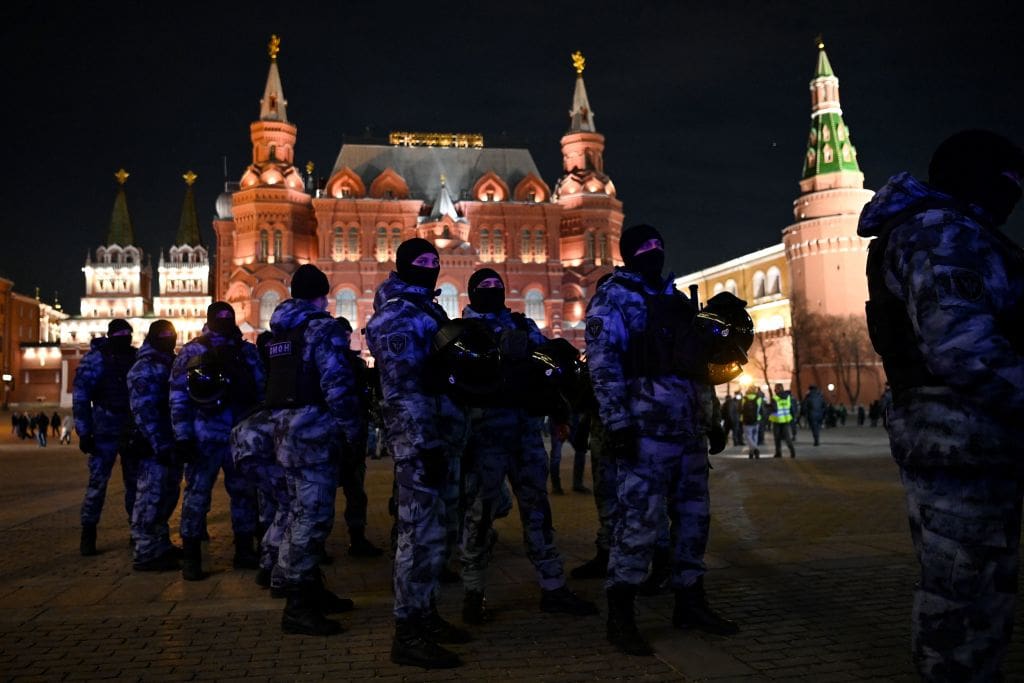The Vasileostrovsky District Court in Saint Petersburg today placed Aleksandra Skochilenko, an activist who replaced price tags in supermarkets with anti-war slogans, into pre-trial detention amid a wider clampdown on a network of feminist-led anti-war activists, Amnesty International said today.
Skochilenko, an artist and musician who performs anti-war songs, was initially detained on April 11, before being interrogated until 3am the next morning. She was then ordered into pre-trial detention until June 1 after being charged with “discrediting the Russian Armed Forces.” She faces up to 10 years in jail.
“The Russian authorities continue to wage war against the human rights of Russian people. All activists detained for peacefully participating in acts of anti-war dissent must be immediately and unconditionally released. Cracking down on this feminist-led anti-war movement represents yet another desperate attempt to silence criticism of Russia’s invasion of Ukraine,” said Marie Struthers, Amnesty International’s Director for Eastern Europe and Central Asia.
According to the prosecution, Skochilenko’s supermarket activism on March 31 was an act of “political hostility” that “disseminated false information” about the use of Russia’s armed forces.
The court hearing was closed to the public to “preserve the secrecy of the investigation” and “ensure the safety of witnesses.” According to Skochilenko’s lawyer, she was reported to the police by a supermarket customer.
The Feminist Anti-War Resistance
Despite relentless efforts by the state to crack down on anti-war sentiment, shutter or block independent media, and the arrests of tens of thousands of protesters, Russian feminists have continued to play a role in the nation’s anti-war movement.
The replacing of the price tags in supermarkets was one of the anti-war actions promoted by the Feminist Anti-War Resistance (FAS). Launched on February 25, a day after Russia invaded Ukraine, the group aims to strengthen the anti-war movement by establishing a network of feminist groups that are critical of the conflict.
“From the outset of the war… we quickly organized ourselves and launched a call stating that the war is contrary to all goals of the feminist movement,” Ella Rossman, one of the movement’s few public faces, told Amnesty International.
FAS supporters have used visual campaigning tools, such as leaflets and anti-war graffiti. They also stamp anti-war slogans on banknotes and print out articles from banned independent media, which remain inaccessible within Russia.
The activists have launched a hotline to offer psychological support to anti-war activists, and an Anti-War Foundation, which helps those who have been fired or expelled from universities over their anti-war views.
By April 4, FAS said they had installed 500 wooden crosses in 41 cities to commemorate civilian victims of the war, while at least 3,000 supporters have taken to the streets with anti-war slogans on their clothes, in activism known as ‘silent pickets’.
Harsh reprisals
FAS women activists have faced harsh reprisals for their activism. At least 100 women activists have been detained, arrested, searched or threatened by the authorities, according to the group.
Yevgenia Isaeva, an artist from Saint Petersburg, was fined 45,000 rubles ($530) on March 30, and later detained for eight days under charges of “hooliganism” over her performance art.
Another artist, Yulia Kaburkina from Cheboksary in Central Russia, was detained on April 2 for “discrediting the Russian military” after she also attached paper figurines of people holding anti-war posters to price tag labels in a supermarket.
In a telegram channel, the activists said: “By replacing something very routine with something alien and unusual, we show that there is not a single place in our country that would not be affected by the war, and we do not let people simply close their eyes to what is happening.”
Background
Aleksandra Skochilenko is the second anti-war activist who has been criminally charged and put under arrest for replacing price tags in supermarkets. On April 5, Vladimir Zavyalov from Smolensk, Central Russia, has been charged with “discreditation of the Russian Armed Forces” under Article 207.3. Overall, more than 20 Russian citizens have been charged under this newly introduced repressive article of the Criminal Code.
Contact: Gabby Arias, [email protected]

